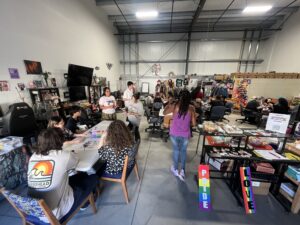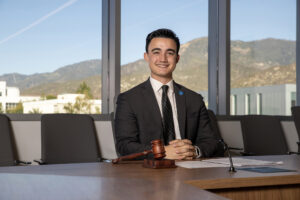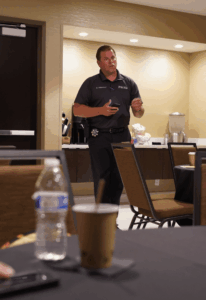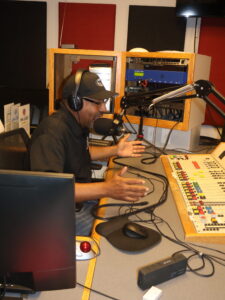Inland Empire Community Fridge opens first refrigerator in Colton
9 min read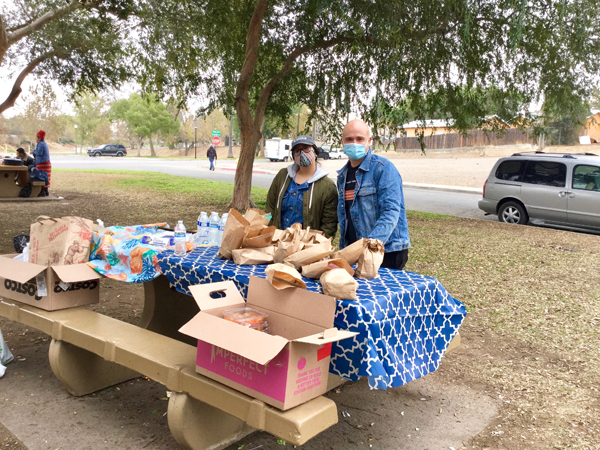
Courtesy photo: UC Riverside seniors Jessica Espinoza and Josh Dunlap started Inland Empire Community Fridges in October. They are pictured here at the “Really Really Free Market” in Riverside’s Fairmount Park in early December, a mutual aid event they host monthly with other local groups.
By Annakai Hayakawa Geshlider
In October, a new organization called Inland Empire Community Fridges opened its first fridge in Colton. For the past three months, volunteers have been stocking the fridge with free fresh food for anyone who needs it.
The Colton fridge is part of the global trend of community fridges that have blossomed throughout the COVID-19 pandemic. Community fridges are usually installed and managed by volunteers, who oversee donations and make sure the food doesn’t go bad. The basic idea: Take what you need, give what you don’t.
The community fridge movement originated in Berlin in 2014, when the volunteer organization Foodsharing began redistributing food to community fridges that would have otherwise gone to waste.
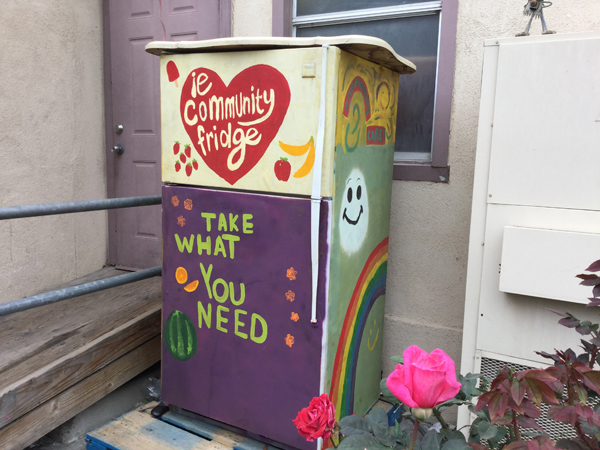
The fridges are now popular throughout the globe — including in Egypt, Lebanon, Thailand, Colombia, Spain, India, and the United Kingdom. Freedge, an organization that promotes community fridges, has documented its presence on every continent except Antarctica. According to Freedge’s online database, there are community fridges in nearly half the states in the U.S. There are currently over 69 community fridges operating in the five boroughs of New York. Los Angeles Community Fridges — a mutual aid network of businesses, organizations, and individuals — now sustains 18 community fridges across the city.
Motivated by the global trend, UC Riverside dance major Jessica Espinoza wanted to start a fridge in the Inland Empire. “The L.A. community and the New York community really inspired me,” said Espinoza. “I’ve seen a lot of homelessness around here, and as someone too that is a student, that is in need of food,” she saw the need for a community fridge. Espinoza contacted her friend and fellow dance major, Josh Dunlap. “I said ‘Hey, is there a fridge out here in the I.E.?”
Dunlap had also been wanting to start up a community fridge. Together, the two formed Inland Empire Community Fridges. The group currently runs one fridge in Colton and has plans to open fridges in Riverside and other cities throughout the Inland Empire.
Individuals of all ages, as well as couples and families, stop by to pick up food from the fridge. “One man walks six miles every day to get sandwiches from the fridge,” said Dunlap. “From Riverside. It’s kind of heartwarming that it’s happening, and it’s heartbreaking at the same time.”
Dunlap and Espinoza are currently searching for a host in Riverside, where they say there is a great need.
Around 20 people per day use the Colton Community Fridge. During one week, “we went through 80 sandwiches and 80 water bottles,” said Espinoza. On a particularly busy day, 25 sandwiches were taken within two days.
The role of community fridges is especially important during the COVID-19 pandemic, Espinoza says, which has hindered food access and employment. The Inland Empire Community Collaborative reports that due to the pandemic, food insecurity in the I.E. has broken previous records. “Food insecure” means a lack of access to enough nutritious food to survive. Over 400,000 people are living in the I.E. who are food insecure, according to the anti-hunger organization Feeding America Riverside/San Bernardino.
In order to install the first fridge, Dunlap and Espinoza visited potential hosts in multiple cities. They needed to find a host with a few square feet of private property where the fridge could be plugged in. Using donations from their GoFundMe online fundraiser, Inland Empire Community Fridges would cover electricity and food costs.
Still, securing a spot for the first fridge was not easy. “Before we got a yes, there were 80 people saying no,” said Dunlap. “They would go into this long rant about how the homeless are dirty, how they don’t want them around. There was a lot of hate.”
After a week of asking around, Espinoza and Dunlap were glad to find a willing host, a local auto shop owner. After the fridge operated on the shop’s property for a week, a group of police arrived.
“They said they were going to confiscate [the fridge] because it was two inches onto public property,” said Dunlap.
When the shop owner agreed to find a different spot for the fridge, a policeman began questioning the owner’s immigration status. Dunlap explained that the shop owner felt he could not safely continue to host the fridge.
“[The fridge] was in the alley; it was not bothering anybody,” said Espinoza. She says she knows there will be people who won’t like the idea of a community fridge. “That’s something that we discussed. We’re gonna have to face that challenge. We have to make sure that with every move, we are doing it with love, compassion, and that it is for the community.”
But Dunlap and Espinoza were determined to find a permanent home for the fridge. After removing the fridge from its original site, Dunlap walked along La Cadena Avenue in South Colton looking for a new host. “Josh literally was taking the fridge with him everywhere, door to door,” said Espinoza. Dunlap came upon the Iglesia Bautista Rayos de Luz, a church at the corner of La Cadena and L.
“The pastor just happened to be out in his backyard,” said Dunlap. “I randomly asked him [if he would host the fridge], ’cause I was asking everybody.”
Pastor Robert Cruz did not have to think twice. “I said, ‘Say no more. Bring it,’” the pastor recalled. “If it’s to help people, I’m in.”
Since then, the fridge has been located behind the Iglesia Bautista Rayos de Luz, on L Street at La Cadena. Pastor Robert already ran his own food pantry out of the church, so he felt a community fridge would fit in well.
Since installing the fridge at the church, operations have been smooth. The fridge is open during daylight hours. Every day, Espinoza, Dunlap, or their volunteers visit the fridge. They fill it with freshly-made sandwiches, fruits and vegetables, and snacks like yogurt and cheese. Kids stop by for juice. There are water bottles and condiments available for the taking.
Pastor Robert enjoys sitting in the church garden, greeting those who stop by to donate and pick up food from the fridge. He chats with regulars and newcomers alike. “One day, I was sitting here, and a guy came by and said, ‘The sandwiches in that fridge are so good!’” the pastor recalled. “I said, ‘You want another one?’”
On Thanksgiving, Pastor Robert said, families stopped by for plates of turkey, stuffing, and mashed potatoes prepared by volunteers.
Since the opening of the Colton fridge, volunteer energy has been high. Volunteers respond to requests on IE Community Fridges’ Instagram or sign up through an online form.
“We really couldn’t have done this without the community,” said Espinoza. “From getting the fridges to painting them, to what it is now. Whenever we ask, ‘the fridge needs some love,’ there are so many people willing to do that.”
For Espinoza and Dunlap, health protocols are crucial for managing the fridge. This is especially important for ensuring the health of community members without health insurance, Espinoza added. Volunteers are directed on how to safely prepare food, wear masks, and wash and sanitize hands. Volunteers label food with the date that it is placed in the fridge, to prevent it from going bad.
Despite the backlash and difficulties Espinoza and Dunlap faced for wanting to start community fridges, the two friends are clear on their goal. “It’s all about giving to our people, and feeding each other,” said Espinoza. “We don’t discriminate who we feed. As long as the food is going out there, for people who really need it.”
At first, not many people knew about the Colton fridge. To get the word out, Espinoza and Dunlap decided to put on events. In cities such as Riverside, “there’s so much need, but we haven’t been able to find a host,” said Dunlap.
Until they install a fridge in Riverside, Espinoza, and Dunlap host community events to provide food and spread the word about the Colton fridge.
One Saturday in mid-December, Inland Empire Community Fridges teamed up with a handful of fellow local mutual aid groups to host the second “Really Really Free Market.” At the socially-distanced event in Riverside’s Fairmount, picnic tables held bagged lunches, plates of hot pasta, canned goods, granola bars, and fruit. There were stations with clothing, shoes, and hygiene kits containing masks, hand sanitizer, and soap. Everything was free.
Throughout the afternoon, individuals and families stopped by the Really Really Free Market to pick up supplies. Because some folks don’t have convenient transportation, said Espinoza, it can be impactful to pick up many supplies all at once.
Espinoza said around 15 people contacted IE Community Fridges on Instagram to help out with the event. To prepare, seven people volunteered to make sandwiches.
“It’s a little bit scary, coming out and doing events like this during COVID,” said Dunlap. “That’s a risk I’m willing to take because I know that people still need daily food.” Inland Empire Community Fridges teamed up with Riverside Food Not Bombs, Communit.IE, and the San Bernardino Brown Berets to put on the Really Really Free Market.
At the event was Steve Fuji, a member of Riverside Food Not Bombs, a volunteer movement with chapters across the globe. Since its founding in 1980, Food Not Bombs has been redistributing food that would otherwise be thrown out.
“There’s no reason for people to go hungry in this country when there’s so much food being wasted,” said Fuji. “The amazing thing is how easily available food donations are. You just have to go ask for it in the right places.”
One of those places is an upscale Italian deli in nearby Canyon Crest, which Fuji says bakes more than it can sell in a day. At the Really Really Free Market, Fuji and fellow volunteers offered extra bread from the deli. They also served containers of hot pasta they prepared themselves.
What’s next for Inland Empire Community Fridges?
“We’re excited to try to get more fridges out there in the I.E.,” said Espinoza. We wanna make sure we’re doing the best that we can to keep [the Colton] fridge working — what works and what doesn’t work — before we get another fridge.”
Thanks to donations, IE Community Fridges has purchased two additional fridges, which will hopefully be installed in other cities soon.
Ideally, future fridges will be installed within bus access. “Anyone who’s willing to let us put [a fridge] on private property and plug it in can host a fridge,” says Dunlap. “That’s basically it.” IE Community Fridges will cover electricity costs using donations, and volunteers will oversee each fridge’s operations.
“[Fundraising] has been slow, but steady,” said Dunlap. “We get regular funds, we get people donating food. And many of our prep volunteers buy their own supplies, so it’s been enough.” When they don’t have enough, Espinoza says, she and Dunlap donate as much as they can from their own pockets.
While Dunlap has done community work in the past, his work with IE Community Fridges is his first major collaboration with others. Originally from Northern California, Espinoza has organized for years. She says because some of her family members have experienced homelessness, and as a student herself is on a tight budget, she understands the need to feed people in her community.
Right now, the best way to support the work of the Inland Empire Community Fridge is through donations of money and food. The money goes toward purchasing food and electricity for the Colton fridge and future fridges, as well as for hand sanitizer and gloves for volunteers.
To donate, visit linktr.ee/iecommunityfridges and click on “IE Community Fridges Fundraiser.” To keep up with IE Community Fridges’ work, follow @iecommunityfridges on Instagram.
According to the L.A. Food Policy Council, Los Angeles has the highest number of food-insecure people in the country, while dumping over one million tons of food into its landfills per year. Similar to community fridges, Southern California organizations Food Forward and Food Finders aim to rescue food that would otherwise go to waste, to provide much-needed fresh produce and meals. To learn more, donate, or volunteer, visit wwwfoodforward.org and www.foodfinders.org. Connect with Riverside Food Not Bombs on Facebook, or Instagram at @riverside_food_not_bombs.
Want to start your own community fridge? Visit L.A. Community Fridges at https://linktr.ee/lacommunityfridge for resources on how to get started, or on Instagram @lacommunityfridges. L.A. Community Fridges hosts virtual volunteer orientations for those interested in getting involved. You can also visit www.freedge.org for resources, view a map of community fridges across the country and worldwide, and connect with other fridge hosts.



